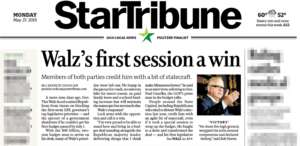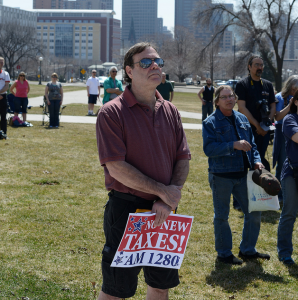 Today in its lead front page story, the Star Tribune trumpeted Governor Tim Walz as the triumphant victor in the recently concluded legislative session. But the truth is, the real victor looks more like conservative devotees of a “no new taxes” pledge.
Today in its lead front page story, the Star Tribune trumpeted Governor Tim Walz as the triumphant victor in the recently concluded legislative session. But the truth is, the real victor looks more like conservative devotees of a “no new taxes” pledge.
For many years, former Governor Tim Pawlenty and the Minnesota Taxpayer’s League’s David Strum enforced strict adherence to a “no new taxes” pledge, even during many years when lawmakers were struggling with huge budget shortfalls. Though Pawlenty and Strum are no longer players, and conservatives have a weaker bargaining position now than they had in those days, Pawlenty’s “no new taxes” position still somehow bested Walz’s “many new taxes.”
- No Gas Tax Increase. Governor Walz wanted a large gasoline tax increase. He didn’t get half of what he recommended. He didn’t get one-quarter. He got no increase. Zip.
- Income Tax Cut. Walz wanted to preserve the status quo on state income taxes. That didn’t happen either. He got a cut instead.
- Provider Tax Cut. Walz desperately wanted to keep the provider tax at the same 2.0% level it has been for years. He got a 10% cut in the tax instead, to 1.8%.
- Overall Revenue Cut. Overall, Walz wanted to raise much more revenue to deliver much improved services. Instead, he got lower overall revenue. As a result, he was forced to dramatically scale back his agenda and a dip into the state’s rainy day fund to balance the budget, a fiscally irresponsible move that DFL former Governor Mark Dayton strongly opposed.
A Walz Win?
With all of this Walz losing on the taxation front, how can Walz be crowned the session’s big winner?
The Star Tribune sees it this way: First, Walz kept legislative overtime to a minimum by capitulating to Republican demands early and often. They seem to put an inordinate amount of value on ending on-time. Second, interest groups who either oppose taxes or support Walz declared him a great guy. Third, Walz declared himself victorious, during a news conference in which he made a touchdown signal. And, duh,everyone knows losers don’t make touchdown signals.
“No New Taxes” Leads To Dozens of Losses
To be fair, the Strib did acknowledge, in the 23rd paragraph where few readers read, that Walz lost on the revenue side of the ledger:
“Still, the cut in the health care tax, coupled with a middle income tax cut of 0.25%, means state government gets less money than if current taxes had stayed in place. On that, Republicans could claim victory too.”
But here’s the thing: “No new taxes” is not just one individual issue that is equivalent to other individual issues debated at the Capitol. Pawlenty and Strum understood that very clearly. They understood that winning on “no new taxes” meant stopping progressives from making progress on dozens of issues.
That’s exactly what happened in 2019.
Without more revenue, Walz-backed improvements in roads, bridges and transit became impossible.
Without more revenue, the large House-passed increases for k-12 education became impossible.
Without more revenue, restoring the Pawlenty-era social services cuts became impossible.
The point: When Tim Walz lost on “no new taxes,” he didn’t lose on one issue. He effectively lost much of his policy agenda.
Walz Reluctant to Use Negotiating Advantage
State budget negotiations can be thought of as a three-legged stool, with one leg controlled by the House, one by the Senate, and one by the Governor. DFLers currently control two-thirds of the legs — the House and the Governor’s office — and Republicans only have one of the legs, with a narrow majority in the Senate. This means DFLers should have an advantage in budget negotiations.
But to tap into that negotiating advantage and move a progressive agenda forward even just a little bit, Governor Walz needed to hold firm, and probably go into legislative overtime. I understand that’s not a pleasant proposition for an affable fellow like Walz, but my guess is that a more progressive and fiery Governor Erin Murphy would have been willing to do that. Governor Tim Walz was not.
If that “no new taxes” trend continues over the next three years, the Walz era may not be as different from the Pawlenty era as progressives like me had hoped. Somewhere I have a suspicion that David Strum and Tim Pawlenty are smirking to themselves.


